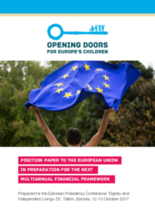Displaying 61 - 70 of 312
This video from UNICEF Rwanda shows some of the moving stories of children and their new families who have been brought together through the TMM initiative, which reintegrates children who have been living in institutions into families and the community.
This position paper from Opening Doors for Europe's Children explains the position of the organization in regards to the EU's Multiannual Financial Framework and the measures within it to support or inhibit the transition from institutional care to family-based care of children.
In this video, social worker Diana Nyakarungi describes how Ekisa Ministries in Jinja, Uganda supports parents to care for their children with special needs within the community.
This video series from Better Care Network, in partnership with Child's i Foundation, highlights promising practices in children's care in Uganda.
This study evaluated the feasibility, acceptance, preliminary outcomes and potential sustainability of a community-based intervention program for left behind children in China.
This study explored the extent to which components of quality of care predicted psychosocial well-being of orphaned and separated children (OSC), as well as the extent to which these components of quality of care and demographic factors moderated the associations between care settings and psychosocial well-being of orphaned and separated children (OSC).
Using inter-agency action research in Sierra Leone, this chapter provides a case study on how a highly collaborative approach can enable child protection research to achieve a significant national impact.
This case study describes the community-based child protection programme implemented between 2015 and 2016 with Burundian girls, boys and adults in Mahama refugee camp in Rwanda.
This paper presents achievements and implications of care and support programmes among OVC in Kogi State, Nigeria
This abstract relays the findings of a survey on informal carers' views and opinions under the current conditions of social support in the Czech Republic.





